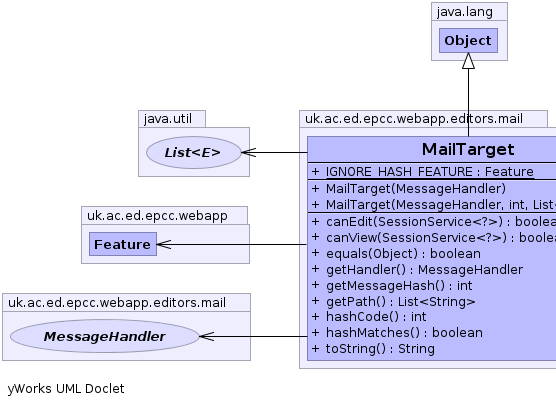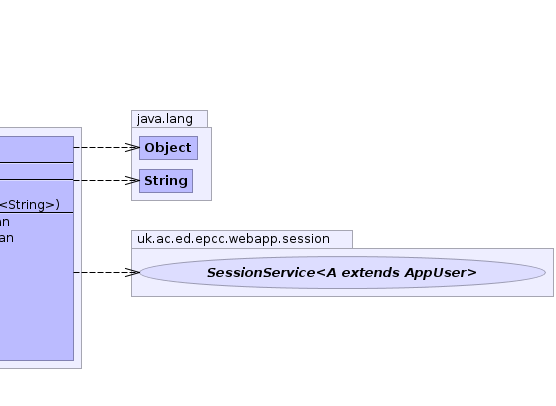- java.lang.Object
-
- uk.ac.ed.epcc.webapp.editors.mail.MailTarget
-
public class MailTarget extends java.lang.ObjectTarget object forEmailTransitionProviderThis not only identifies the email message but also a location within the message. The mssage hash is also stored explicitly so we can detect if the has sent by the user is the same as the hash of the stored object. If they differ the user has started from an out of date state.
-
-
Field Summary
Fields Modifier and Type Field and Description static FeatureIGNORE_HASH_FEATURE
-
Constructor Summary
Constructors Constructor and Description MailTarget(MessageHandler handler)create a MailTarget with the hash derived from the handler.MailTarget(MessageHandler handler, int hash, java.util.List<java.lang.String> path)create a MailTarget with an explicit path and hash from the user.
-
Method Summary
All Methods Instance Methods Concrete Methods Modifier and Type Method and Description booleancanEdit(SessionService<?> operator)booleancanView(SessionService<?> operator)booleanequals(java.lang.Object obj)MessageHandlergetHandler()intgetMessageHash()java.util.List<java.lang.String>getPath()inthashCode()booleanhashMatches()java.lang.StringtoString()
-
-
-
Field Detail
-
IGNORE_HASH_FEATURE
public static final Feature IGNORE_HASH_FEATURE
-
-
Constructor Detail
-
MailTarget
public MailTarget(MessageHandler handler) throws java.lang.Exception
create a MailTarget with the hash derived from the handler. This is appropriate when the target is created directly for example as the result of a creation operation. The path is always null referring to the entire message- Parameters:
handler-- Throws:
java.lang.Exception
-
MailTarget
public MailTarget(MessageHandler handler, int hash, java.util.List<java.lang.String> path)
create a MailTarget with an explicit path and hash from the user.- Parameters:
handler-hash-path-
-
-
Method Detail
-
toString
public java.lang.String toString()
- Overrides:
toStringin classjava.lang.Object
-
getHandler
public MessageHandler getHandler()
-
getPath
public java.util.List<java.lang.String> getPath()
-
getMessageHash
public int getMessageHash()
-
canView
public boolean canView(SessionService<?> operator)
-
canEdit
public boolean canEdit(SessionService<?> operator)
-
hashMatches
public boolean hashMatches() throws java.lang.Exception- Throws:
java.lang.Exception
-
hashCode
public int hashCode()
- Overrides:
hashCodein classjava.lang.Object
-
equals
public boolean equals(java.lang.Object obj)
- Overrides:
equalsin classjava.lang.Object
-
-

